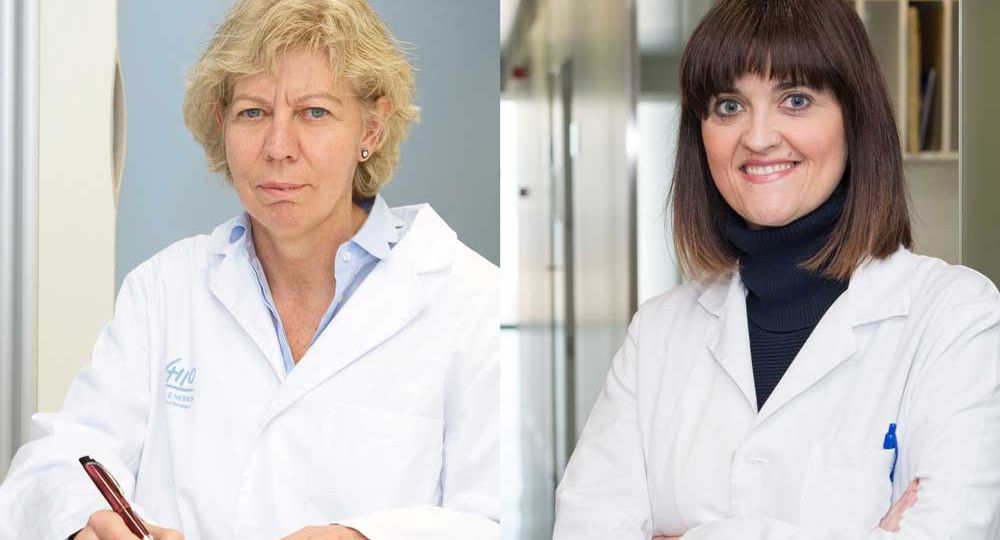

Officially announced last week, the Spanish Association against Cancer (AECC), and the Institute of Health Carlos III (ISCIII) have awarded leading Spanish cancer research institutes participating in five projects through the ERA-NET: Aligning national/regional translational cancer research activities – TRANSCAN-2 project funded by the EU´s Horizon 2020 framework program.
Under the TRANSCAN Joint Translational Call 2016 on Minimally and non-invasive methods for early detection and/or progression of cancer, VHIO is partner of two out of the five, and will participate in the majority of the respective work packages.
Based on her team´s renowned expertise in developing liquid biopsy at clinical level which has resulted in the establishment of a dedicated circuit for liquid biopsy sample collection, patient follow-up and sample preparation, Enriqueta Felip, Principal Investigator of VHIO´s Thoracic Tumors & Head and Neck Cancer Group, will spur efforts to establish non-invasive prognostic markers for resected early-stage non-small cell lung cancer (NSCLC) by assessing the role of circulating and exosomal miRNAs and free circulating DNA (fcDNA).
Given that NSCLC is the primary cause of cancer-related death and despite the fact that about 20% of cases are diagnosed at an early stage allowing for pulmonary resection, lung cancer survival rates of five years unfortunately remain below 16%, mainly due to disseminated disease. It is therefore critical to study these markers singly or in combination and establish their capacity to predict patients who have a high risk of relapse and poor survival with respect to those with a better prognosis.
“It is thanks to the advent of less-invasive blood-based approaches that we are making important progress in identifying prognostic markers in order to more precisely predict outcomes for our patients. It is only through the backing received from essential programs such as EU´s Horizon 2020 and entities including AECC and ISCIII, that we can hope to deliver on the true promise of precision medicine in oncology”, observes Enriqueta Felip.
As highlighted within the project documentation, her pioneering research, in collaboration with VHIO´s Cancer Genomics Group led by Ana Vivancos, also aims at characterizing blood-based tumor-educate platelets (TEPs) for the evaluation of patients treated with immune checkpoint inhibitors using novel sequencing technologies.
“We are also currently exploring Platelet RNA as liquid biopsy technology that may more accurately and effectively guide immunotherapeutic strategies for the treatment of patients suffering from NSCLC. This research, fueled by Merck, pairs liquid biopsy technology with immunotherapy to more accurately and effectively guide novel treatment strategies”, she concludes.

Led by Elena Elez, Medical Oncologist and Clinical Investigator of our Gastrointestinal & Endocrine Tumors Group – headed by Teresa Macarulla and directed by Josep Tabernero, VHIO will participate in a second AECC-ISCIII TRANSCAN-2 selected study aimed at the early detection of relapse in advanced colon cancer patients by longitudinally following a personalized molecular signature by liquid biopsy.
This proof-of-concept, prospective, multi-center study will primarily seek to evaluate the clinical feasibility of ´policing´ tumor progression by dynamically detecting a molecular and personalized signature from a blood test. This innovative approach for the early detection of relapse represents an important step towards more accurately tracking disease progression.
Secondary objectives have been defined as analyzing the respective performance of each qualitative and quantitative circulating free DNA (cfDNA) parameters, furthering insights into the clonal evolution of cancer drivers under standard care and surveillance, and comparing data with conventional biomarkers and imaging.
“Tumor relapse and metastatic spread are the major contributing factors to colon cancer mortality. Unfortunately, despite major advancements in better treating this disease as well as more ´intelligent´ surveillance strategies, the overall rate of curative resection in recurrent patients relies on the early detection of recurrence”, comments Elena Elez.
With its established, purely translational and multidisciplinary program directed at the study of circulating biomarkers, the detection and genotyping of cfDNA, VHIO teams have extensive experience in liquid biopsy. Our Institute incorporated in-house BEAMing liquid biopsy RAS biomarker technology back in early 2015 and was the first academic test center to do so. Significant progress has since been made in validating and developing liquid biopsy and Droplet Digital PCR Bio-Rad technologies for the more effective, less invasive monitoring of cancer over time, in real time. VHIO groups have also recently demonstrated the practicality and feasibility of using ctDNA analysis as a novel and alternative approach to establishing the eligibility of patients for anti-EGFR therapy.
“Thanks to this AECC-ISCIII TRANSCAN funding, I am optimistic that our expertise at VHIO coupled with that of our co-collaborators, will enable us to use this novel approach in successfully detecting relapse in colon cancer patients sooner”, she concludes.
###








